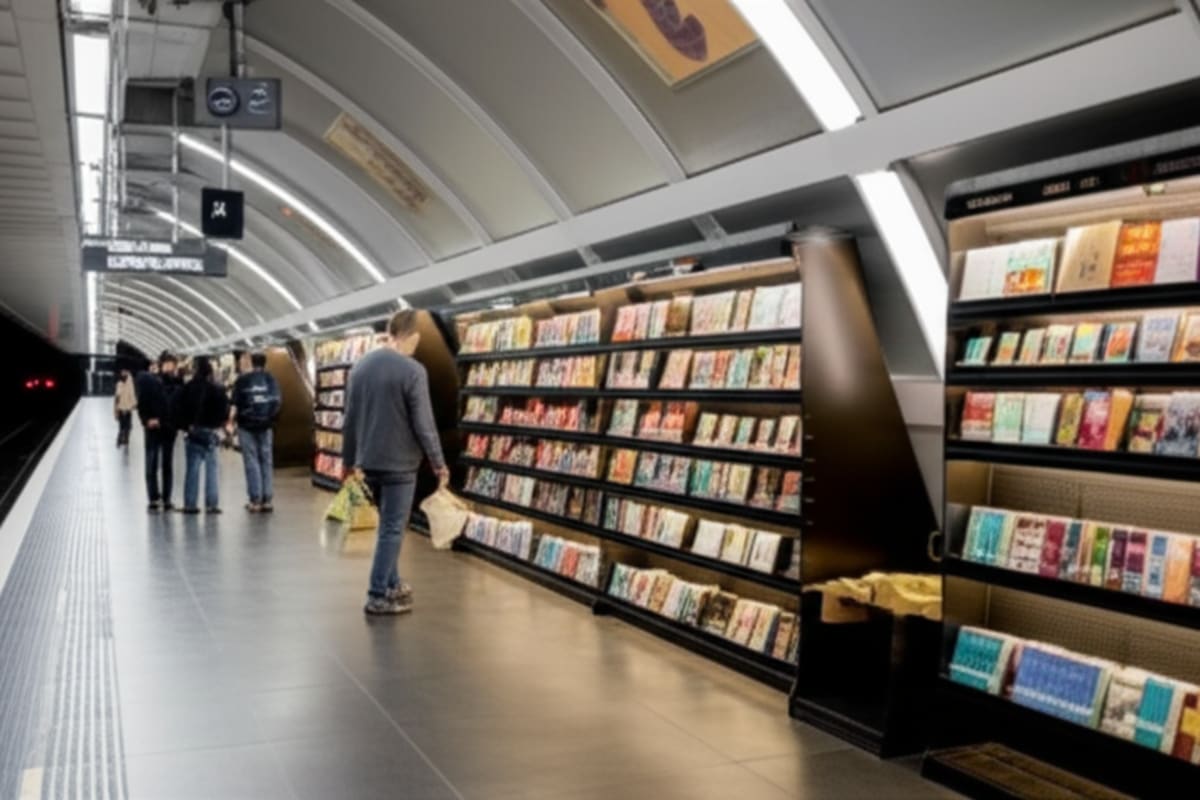Warsaw's Underground Oasis: Metro Station Becomes 'Express' Library

Warsaw, Poland – In a bold move to foster literacy and provide a welcome respite from digital distractions, Warsaw has unveiled "Metroteka," an innovative library within the Kondratowicza metro station (M2 line) in the Targówek district. The initiative seeks to transform the daily commute into an opportunity for intellectual enrichment, offering a haven for book lovers and a compelling alternative to smartphone screens.
Background
Metroteka's arrival is especially significant considering Poland's history.
The Second World War inflicted devastating losses on the nation's cultural heritage, including the destruction of countless libraries
This initiative represents a powerful step towards rebuilding and revitalizing the country's literary landscape, promoting cultural access and bolstering literacy rates
A Vibrant Cultural Hub Beneath the City
More than just a repository of books, Metroteka is designed as a thriving cultural hub.
The station library features thoughtfully designed reading areas for both adults and children, creating an inviting and stimulating atmosphere for all
Comfortable seating and ample lighting encourage visitors to linger and immerse themselves in the world of literature
The library also boasts a dedicated space for public readings, author talks, and other literary events, fostering a sense of community and providing opportunities for intellectual exchange
This dynamic programming promises to engage residents and transform the metro station into a vibrant center of cultural activity
Perhaps the most striking feature of Metroteka is its incorporation of a vertical garden.
This verdant oasis brings a touch of nature to the otherwise sterile environment of the underground station, creating a calming and aesthetically pleasing space that enhances the overall reading experience
The attention to detail reflects a commitment to providing a holistic and welcoming environment, elevating the library beyond its functional purpose
Global Implications and Relevance to Southeast Asia
The implications of Warsaw's Metroteka extend far beyond the city limits.
This innovative project serves as a model for cities worldwide grappling with declining reading rates and the pervasive influence of technology in modern life
It offers a practical and accessible solution to promoting literacy and fostering a love of reading in an increasingly digital world
The Metroteka model holds particular relevance for Southeast Asia, a region characterized by high smartphone penetration rates and rapidly evolving reading habits
Many Southeast Asian countries face similar challenges in combating digital distractions and promoting literacy, particularly among younger generations
Warsaw's initiative offers valuable insights into how to adapt and implement similar projects in major Southeast Asian cities, tailoring the concept to local contexts and cultural preferences
Adapting the Model for Southeast Asia
To ensure the success of a Metroteka-inspired project in Southeast Asia, adaptation is key.
Incorporating local languages and literature into the collection would be crucial for resonance, reflecting the rich cultural diversity of the region
The library's design could also be adapted to incorporate traditional Southeast Asian architectural elements, creating a space that is both modern and culturally relevant
Furthermore, partnerships with local schools, universities, and community organizations could help extend the library's reach and promote literacy initiatives beyond the metro station itself
Educational programs, storytelling sessions, and book clubs could be organized in collaboration with these partners, fostering a deeper engagement with literature and promoting a culture of reading
The vertical garden concept, too, could be adapted to utilize local plant species, adding an ecologically conscious dimension to the project and celebrating the region's unique biodiversity
This would not only enhance the aesthetic appeal of the library but also promote environmental awareness and sustainability
Challenges and Considerations
While the Metroteka model holds great promise, its success hinges on several critical factors. Accessibility is paramount.
Ramps, elevators, and audio-visual aids should be incorporated to make the library accessible to all
Furthermore, the library’s hours of operation must be carefully considered to accommodate the schedules of commuters.
Extended hours, including evenings and weekends, would maximize accessibility and ensure that the library is available to a wide range of users
The quality and diversity of the book collection are also essential to attract and retain readers.
A curated selection of titles, catering to a variety of interests, reading levels, and age groups, is critical
This should include both classic literature and contemporary works, as well as fiction and non-fiction titles
Regularly updating the collection with new releases and popular titles will also help to keep the library relevant and engaging
Finally, promoting the library effectively through various channels, including social media, local community outreach, and partnerships with local media outlets, will play a vital role in increasing awareness and attracting patrons
Utilizing targeted advertising and public relations campaigns can help to reach a wider audience and highlight the library's unique offerings
Conclusion: A Model for the Future of Urban Literacy
Warsaw's Metroteka represents a creative and potentially transformative initiative to combat declining reading habits and promote a love for literature
Its success will be closely watched by urban planners, policymakers, and educators worldwide, particularly in regions such as Southeast Asia, where adapting this model could offer a valuable contribution to enhancing literacy rates, fostering community engagement, and creating vibrant cultural spaces within the urban landscape
Key Insights:
- Innovative approach to combating declining reading habits and promoting literacy in an urban setting.
- Significant potential for replication and adaptation in other cities, particularly in Southeast Asia, with tailored modifications to suit local contexts.
- Strong emphasis on creating a holistic and inviting cultural space that transcends the traditional notion of a library.
Contextual Analysis:
The initiative is particularly relevant in the context of Poland's post-war history and the global trend of declining reading rates amidst increasing smartphone usage
The concept has significant implications for Southeast Asia, where similar challenges exist regarding digital distraction and literacy promotion
This offers the potential to cultivate stronger communities through the written word
